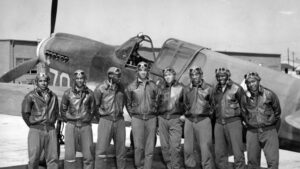Learning Library presents
Tuskegee Airman: The Men Who Refused to be Washed Out 25
Feb 19, 2025-Feb 20, 2025
|
During World War 2 a group of courageous men had a desire to fight for their country even though their country did not fight for them. This is a story of one of the airmen who shows not only what he had to endure just to serve but the character traits needed to endure. |
|
 |
 |
The audience will also get a glimpse of what it was like inside the cockpit of a world war 2 bomber plane. |
| The Tuskegee Airmen were the first African American pilots in the United States military. Their success in combat helped lead to the racial integration of the armed forces in 1948 |
 |
America’s involvement in World War II
SS5H4.e The student will explain the reasons for America’s involvement in World War II i.e. Describe the effects of rationing and the changing role of women and African Americans; include “Rosie the Riveter” and the Tuskegee Airmen.
Teacher Notes for the Georgia Standards of Excellence in Social Studies:
African-Americans found themselves recruited for factory and other jobs needed for the war effort. Factory jobs continued to attract migrants from rural areas, and often allowed African Americans to reach new levels of job success. In addition, the United States military opened access to military careers that had been denied them earlier. One example of this was the Tuskegee Airmen. The first African American pilots in American military history, the Tuskegee Airmen, began training in Tuskegee, Alabama, in 1940. From there, this group of pilots and support personnel trained and served during World War II. They proved to be skilled pilots and served bravely in numerous military engagements. Teachers will want to note that returning American servicemen reclaimed many industrial jobs following the war, and the surge in women in the workforce did not continue in the post-war years. Equally, some African-Americans found themselves unemployed with the return White servicemen. Many advancements proved to be short-lived.
Vocabulary: homefront, workforce, rationing, ration cards, overseas, industry, production, propaganda, recruited, servicemen,
Resources:
- Smithsonian Learning Labs –
- WWII and the Tuskegee Airmen: lesson plans, primary sources, video clips, artifacts
- https://learninglab.si.edu/collections/wwii-and-tuskegee-airmen/kwAJnciMNocBU8r5#r
- WWII and the Tuskegee Airmen: lesson plans, primary sources, video clips, artifacts
- History.com –
- Rosie the Riveter: background information, primary sources, photos, artwork, etc. appropriate for teacher selection (ads on site)
- http://www.history.com/topics/world-war-ii/rosie-therivete
- Rosie the Riveter: background information, primary sources, photos, artwork, etc. appropriate for teacher selection (ads on site)
- Tuskegee Airmen – background information, photos, and other rich resources about these pioneers
- http://www.tuskegeeairmen.org

